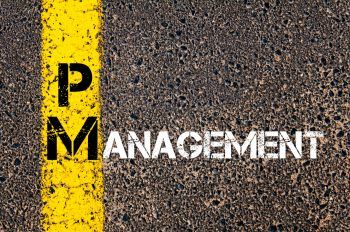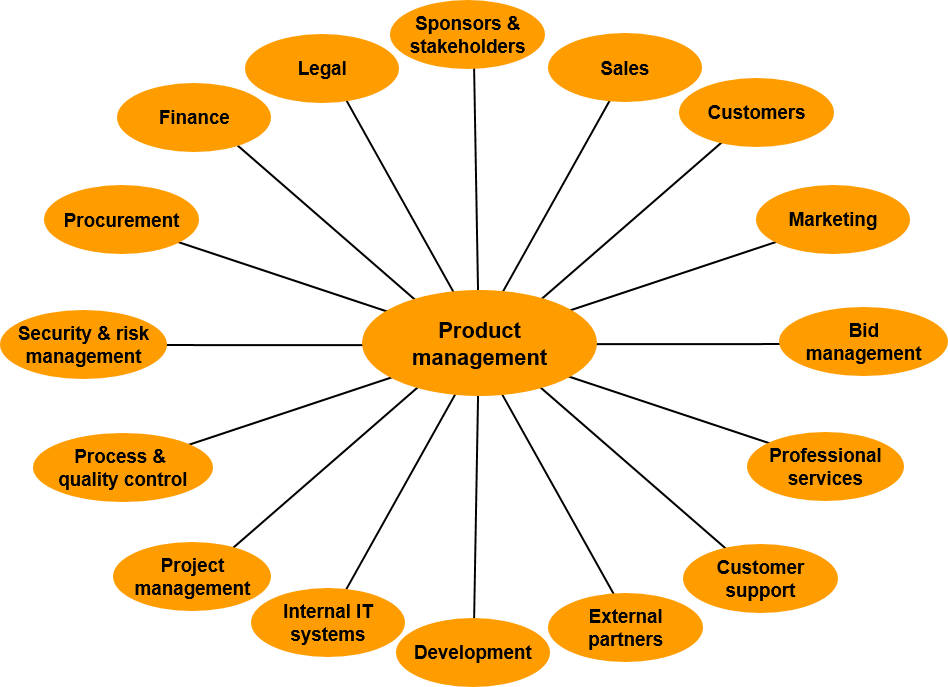
At a past product management event we hosted, a delegate jokingly asked:
“What does the ‘P’ in Product Management (PM) really stand for?”
The answer? “It stands for People Management!”
This response sparked an interesting thought: What else could the “P” represent?
Let’s explore…
People Management
A lot of what you need to get done as a product manager has to be done by other people.
The diagram below shows how the role can touch nearly every other part of the organization.
Starting on a business case? Well, you’ll need to work with your Finance guys, speak to Sales to get their forecast input and talk to each department to understand the impact on their area.
These people don’t report to you. What you want is probably not top of their priority list. They might even be completely against your new product as what you’re asking for conflicts with their objectives.
You have to persuade them to help you. This means putting effort into building a good working relationship and earning their respect. It takes diplomacy and tact. You need to master your facts. Have logical arguments. Be enthusiastic. Work out how you can help them in return. All your influencing skills come into play – you have to persuade, sell, trade, cajole, bribe, blackmail …
I always used to take a box of doughnuts along to my first meeting with the Development team. A blatant bribe to get in their good books. Still, it seemed to work when I needed a small favor later on.
Project Management
Product management and project management are often confused – well they’re both abbreviated to PM. And although our focus is on our product, not a one-off project, a lot of what we do day-to-day is managing mini-projects. For example, the project to get the business case complete, launch a new product, or to do some competitive analysis.
As a product manager, having some project management skills is hugely beneficial. Understanding things like the importance of setting expectations correctly, managing stakeholders, tracking progress, and avoiding scope creep are vital if you want to be effective.
Personal Management
In my experience, being a product manager is a very busy job. So you’ve got to manage your time and priorities very carefully.
Not long ago, I learned the importance of turning off the notification each time I got a new email. I couldn’t resist checking when I got the ping (of course, they were usually spam). And each time, it interrupted my stream of thought and distracted me from what I should have been getting on with.
Although not unique to product management, working out how to manage your time effectively is essential. You need to be able to focus on what’s important, get the most out of meetings, and handle your emails efficiently.
Treat your time as a precious commodity – spending it wisely on things that are likely to make the biggest difference.
Proposition Management
If you’re a product manager from a technical background, it’s very easy to think of your product as a data sheet … a list of features.
However, your customers care about what the product will do for them, i.e., the benefits they will get from using your product. That’s why they buy. Features are important but many other aspects will contribute to their buying decision such as price, support options, training, terms, and conditions, etc.
To succeed, you need to think about the wider proposition, not just the product.
Can you think of any other P’s ?
Maybe PowerPoint Management 🙂
Ian Lunn
Director, Product Focus



Join the conversation - 5 replies
PM is often mistaken for project management, while it needs a good portion of it anyway. So the PowerPoint Management is a good one too, while I hate it. In many ways it is Proposition Management.
But in general Product Management as such is a wide field. I am more the technical PM, good for getting a new innovative product onto the market, from first ideas to first delivery. I do not like the rest of the PLM too much, prefer to go for the next innovative product instead (but seldom enough I am able to as the job demands it).
As long as the Profile Managers keep out of my way, I’m fine 😉
Looking at the drawing, I see the PM at the center of the galaxy with all other functions orbiting around him. A metaphore of what he’d like to be and the mass he should have to provide enough gravity ?
Then P stands for Planetarium.
Thanks for the nice article, it nicely describes the day to day practice.
Another P I run into is the one of Priority, it is always a battle to divide time between customers, existing and new products and to allocate the right amount of resource to the next great product. Even to determine the next great product could be a Priority call on it self to decide where to spend the development money on.
Hi there,
I believe “P” also means “programme”. You already covered P as Project but why not P as programme? Product Managers don’t only handle mini-projects and deliver results but must at all times keep in mind the “bigger picture”, how these mini projects fit with the rest of a company’s efforts, the product management lifecycle, timeline, and last but not least, similar to how a PM must always find and develop more efficient and better use of a product, a PM must also ensure that any process used by him or herself is the most efficient and effective process. This could be time management, resource management, budget management, etc… As a 14-year veteran of Product Management myself, I cannot (and refuse to even when asked) separate the 2. For me, a product manager truly is a (mini)CEO but unfortunately I have found a lot of resistance in my career when trying to link the 2 together. This resistance is usually rooted in individual or collective political agendas, fear, lack of time and/or resource to venture into areas other than those tasked to you by the powers that be.
It’s true that a company CEO has a lot more considerations than a product manager when it comes to the company, it’s environment, it’s partners, the market, political landscape, laws, duty to shareholders, etc… but how is that thinking concept any different to what a PM must consider when he or she is working on a new product, a business case, a launch, a product in market, etc…?
I feel a lot of PM roles are restricted by design. I truly believe a PM role is at the center of a company but I personally do not believe it is independently responsible for the success or failure of any product or company. I have learned a long time ago to accept and appreciate the inter-dependency of my role and I act accordingly. I just hope that other roles in a company would adopt a similar level of acceptance and that the entire company aims to achieve the common goal.
PS: I would like to see a blog, or forum or even a webinar from you guys on how different a PM role of a product vs. a PM role of a service really is.
Thank you,
Hi,
Thank you for the really good article.
BR
Michael